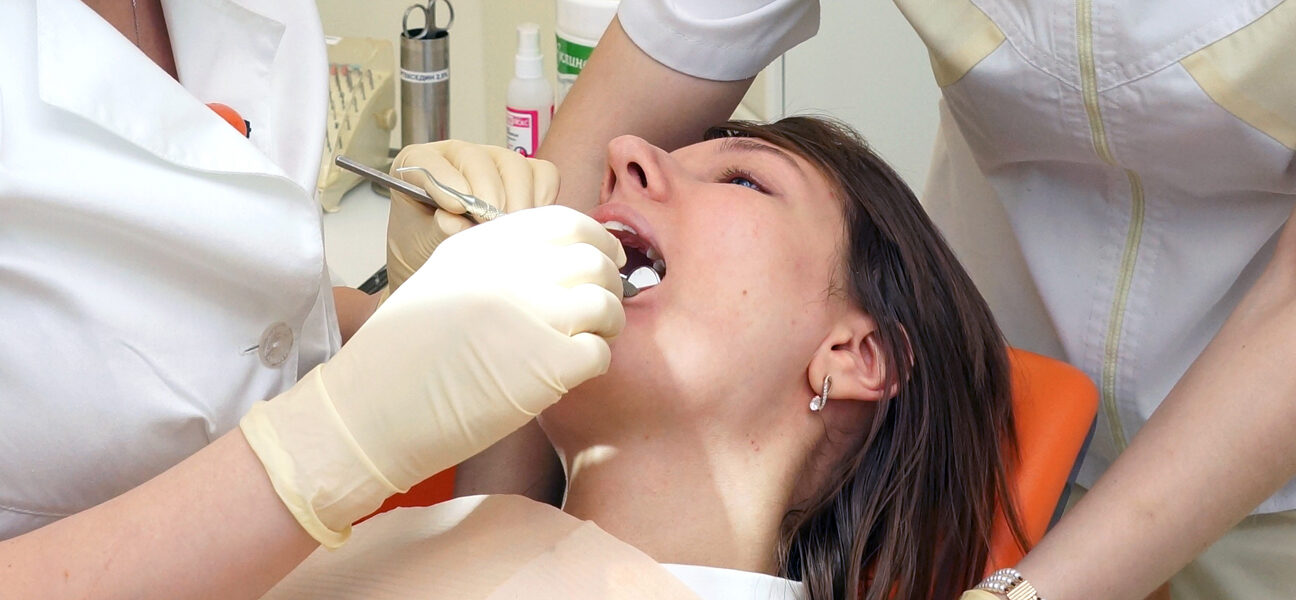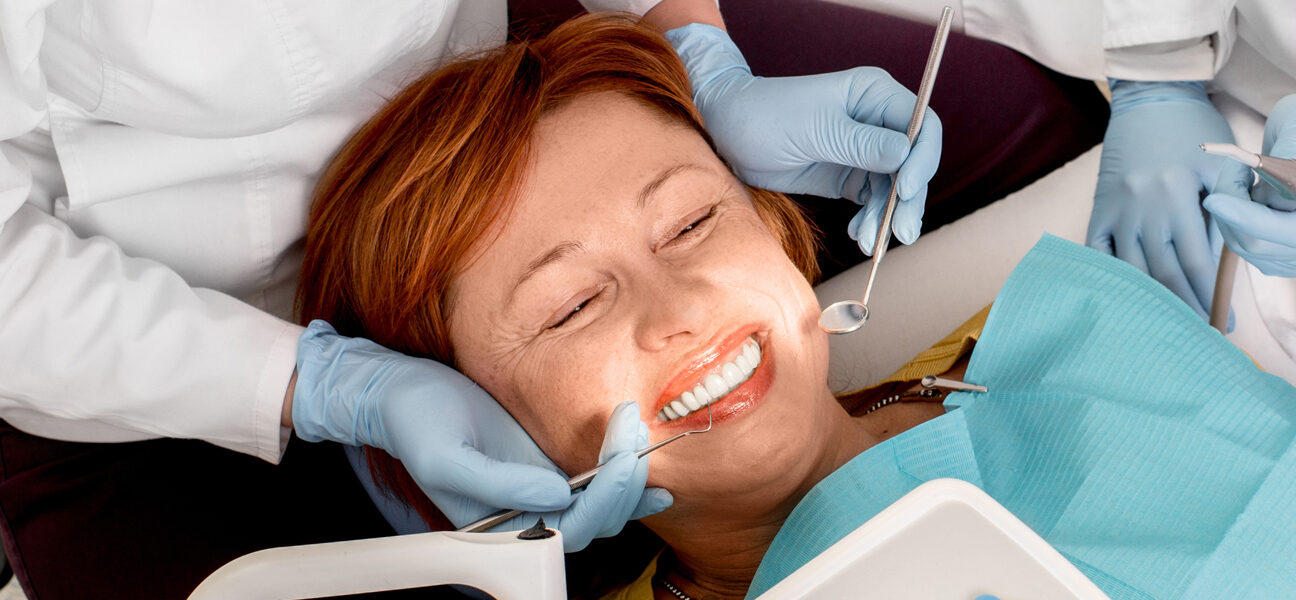Author: LInCo_aDmEeN
Why Everyone Prefers Invisalign Over Traditional Braces?
Invisalign and braces both are the preferred dental treatment. They are magically helpful in correcting the alignment and structure of the teeth. A perfect alignment always results in a beautiful smile. That is why many people always crave to have perfect dental shape and tooth structure. Do people always debate on which treatment they should go for-Invisalign or braces???
Well! Both the treatments are amazing. Both have shown their effective and positive results on millions of people.
What is Invisalign????
These are also called clear aligners. It would be a new term for those who take traditional braces as the only treatment for correcting teeth alignments. But this is not the truth.
Invisalign aligners have become a prominent replacement for metal braces. They took half of the time taken by braces to fetch the desired results. They are invisible and can get on and off at any time. It may be the reason why people prefer to go for them.
What Is Invisalign Made Of?
These aligners are made of BPA-free plastic, which is almost invisible. Additionally, they provide comfort while wearing. Dentists recommend it to use for an overbite, underbite, poor alignments, and more. Anyone having poor teeth structuring can go for Invisalign in Lincoln, NE.
These aligners are suitable for teens as well as for adults as well. People are having productive results with Invisalign aligners worldwide as they are already exercising. It’s safe to go for them and additional information and guidance, Dr. Barion Dalton says.
Benefits of Invisalign
As everyone out there is aware of the procedure, more and more people are attracted to these magical aligners. There are so many reasons for having them.
Invisible
Invisalign aligners are invisible and are not noticeable. There is a long list of people who don’t go for braces like dental treatment because they don’t want to tell the world that they are getting an ortho dental procedure.
But on the other hand, aligners resolve this issue for them. They provide freedom to go out in public while wearing them. This prevents embarrassment. People can talk and smile freely.
Utmost Oral Hygiene
As aligners are removable, you can remove them while eating and brushing. Like wearing braces, you don’t get a chance to remove them. As they are always there, you can’t keep your oral hygiene up to date as food gets stuck.
After doing your best, you can’t clean it properly. Wearing braces block you from in-depth cleaning of your mouth. To know how Invisalign aligners work, you should consult a cosmetic dentist near you.
No-Dental Emergencies
If you wear metal braces, they are quite difficult to replace once installed inside. Most of the time, people face problems because they get broken. When it happens, they need to go to the dentist immediately. Such emergencies are not there with aligners. They are robust. Therefore, there are minimal chances for such happenings and to find an emergency dentist in Lincoln.
Fewer Visits to the Dentists
Aligners are comfortable to wear and are removable. There is no such headache of going to the dentist again and again for adjustments as one needs to do while wearing traditional braces. When you wear braces, you have to follow a routine to visit the dentist’s office near you every four weeks. It helps the dental professional readjust braces and tightens the metal wires. On the other hand, aligners are easily replaceable at home with a new set.
Braces Vs Invisalign-Which Treatment Should I Pick?
Both braces and Invisalign are beautiful treatments for restructuring teeth. Neither of them has 100% accuracy. Both have their pros and cons. Some people may choose braces and others may go for Invisalign based on their requirements.
- As aligners are removable, they may be less effective than braces.
- Braces involve a small amount in installation, whereas aligners are costly.
- Braces are there 24*7. So, they are more effective.
- Braces show their best results on overly crowded and crooked teeth. However, there are fewer expectations from aligners.
According to Lincoln dental associates, both are superb treatments. People should go according to their needs and affordability. Make your choice wisely because you are working to own your smile back.
What Are the Different Applications of Dentures?
What Are Dentures?
A denture is an oral application for restoring lost teeth and the surrounding tissues. Unlike other tooth replacement solutions in dentistry, dentures in Lincoln, NE, come with a plastic-like gum surface that can restore the damaged surrounding tissues. The number of artificial teeth present in a denture depends on the number of natural teeth you have lost. As such, two categories of dentures exist:
- Full dentures – consists of all teeth typically present in a human mouth. A full denture will replace all your teeth. It means that if you have a few natural teeth remaining, Dr. Brion Dalton at Lincoln Dental Associates dental offices must remove them first. Full dentures work amazingly for elderly patients who have already lost all their natural teeth.
- Partial dentures – partials are alternatives to complete dentures. They allow you to retain your remaining natural teeth by replacing only the missing ones. Partials are customizable for any teeth in your mouth so that both the back and front teeth are replaceable with partial dentures.
The Applications of Dentures
Although there are two main categories of dentures, the applications differ. It usually depends on your preference as a patient. If you need a permanent tooth replacement solution, the application protocol will be different from that of a patient who needs a removable option. The applications of dentures are:
- Immediate dentures – are available for an immediate restoration. Ideally, soon after a tooth extraction procedure to remove any remaining teeth, you can get immediate dentures. You do not require any downtime for healing before getting immediate dentures. The idea is to ensure you do not go a single day without teeth. After about six months, your mouth should have healed properly, and you can approach your dentist in a dental office near you to fit your dentures. These dentures are a lot easier to customize than permanent dentures.
- Overdentures – are dentures placed to your jawbone over natural tooth roots or implants. If you have a few natural teeth remaining, an overdenture goes over the roots of those teeth. If not, you may need a surgical procedure to install dental implants in your jawbone. The implants will act as the support system for the overdentures. The good news is that overdentures are easier to remove than permanent dentures.
- Implant-supported dentures – are permanent installations for restoring lost teeth. The application requires a surgical procedure to place implants and a different procedure to affix the dentures. If you are getting partials, you will need a different number of implants than when getting full dentures. Your dentist will help you understand the all-on-4 implant concept for installing permanent dentures. The technique dictates having between 4 and 10 dental implants strategically placed in your jawbone to support dentures.
Dentures Benefits Explained
When you first witness tooth loss, you rush to an emergency dentist in Lincoln, shocked and overwhelmed. It almost feels like you are at a disadvantage, especially when you think of spending the rest of your life without teeth. Fortunately, dentures have played a significant role in restorative dentistry, providing various benefits, including the following:
- Natural-looking results – dentures feature a thermoplastic gum-like base that mimics natural gum tissue. Besides that, the artificial teeth in dentures vary in color shades, allowing you to pick teeth that closely match the color of your natural teeth. The result is a natural-looking smile that will be hard to differentiate from your natural teeth.
- Overcoming bone tissue degeneration – when you lose teeth, the jawbone remains inactive. It allows for tissue degeneration that may eventually affect your facial appearance. Depending on the denture application of choice, your tooth-replacement process will help overcome bone tissue degeneration.
- Versatility – tooth replacement with dentures is versatile enough to cover various dental needs. Whether you need a permanent solution or prefer to preserve your remaining natural teeth, the applications of dentures support varying preferences.
- Perfect for multiple tooth replacement – other alternatives for replacing lost teeth are effective for restoring one tooth at a time. Dental bridges only go as far as replacing three missing teeth in a row. For patients who need multiple teeth replacements, dentures are the best fit.
How Is Invisalign Better Than Metal Braces?
Metal braces were introduced over a century ago and have proven as optimal solutions to straighten crooked, gapped, and misaligned teeth besides correcting a misaligned jaw. Metal braces are considered the gold standard for orthodontic corrections if you are affected by any of the conditions described.
Invisalign is an upstart that changed orthodontic treatments forever in the late 90s by introducing revolutionary clear aligners for straightening teeth without having metal wires or brackets on your teeth. Invisalign indeed proved revolutionary because it encouraged patients to seek orthodontic treatments they were ashamed of because they didn’t want metal braces over their teeth for three years or more. Currently, over 20 percent of American adults are wearing Invisalign clear aligners on their teeth to correct dental imperfections like underbites, overbites, crossbites, open bites, gapped teeth, crooked teeth, et cetera.
Invisalign is undoubtedly the preferred method among adults and teenagers to straighten teeth than metal braces. However, is Invisalign better than metal braces? If you aren’t aware, please read this article to convince yourself which option you must consider for correcting orthodontic problems.
Invisalign or Metal Braces: How to Choose?
If you have orthodontic issues with your teeth and seek treatment as an adult, you would undoubtedly prefer to have an Invisalign in Lincoln, NE, than metal braces. However, deciding by yourself without visiting the facility providing Invisalign is an error you mustn’t commit. Remember, dental professionals, are best equipped to determine which treatment option is best suited to correct the problems with your teeth and jaw.
Your preference for Invisalign clear aligners would undoubtedly receive encouragement from the clear braces made from dental-grade BPA-free plastic that remain virtually unnoticeable over your teeth when wearing them. In addition, you might prefer Invisalign over metal braces because of their removable feature that provides you freedom from the restrictions imposed by metal braces when eating foods or cleaning your teeth. However, is it the only reason you prefer Invisalign over metal braces? If not, we suggest you visit the dental office near you to determine whether you qualify for Invisalign treatment before you make up your mind about getting Invisalign aligners to straighten your teeth.
What Are the Qualification Criteria for Invisalign?
We have earlier described the problems Invisalign can treat, and they can do it faster than metal braces. So long as you comply with the requirements of Invisalign treatment, you can benefit by having straighter teeth and a beautiful smile within 12 to 18 months. However, you began witnessing results within weeks of starting your treatment.
Invisalign clear aligners are comfortable and will not require repeated visits to the emergency dentist in Lincoln to repair broken orthodontic wires or dislodged brackets because none exist. The aligners are delivered in a single piece that you wear over your teeth for approximately a fortnight before replacing them with another batch. Invisalign braces are removable and must be removed when eating or drinking anything but water and to maintain excellent dental hygiene. However, you must ensure the aligners remain on your teeth for 20 to 22 hours every day if you intend to complete your orthodontic treatment within 12 to 18 months.
Every six to eight weeks, you must schedule an appointment with Dr. Brion Dalton to assess your progress and to collect your new batch of aligners. The delayed dental visits indicate that you don’t need to get the aligners tightened or adjusted every month to retain pressure on your teeth when moving them.
Compliance with the requirements of Invisalign treatment is essential because you cannot leave your teeth without the aligners when undergoing treatment. Therefore so long as comfort and aesthetic appearance are concerned, besides the speed at which Invisalign helps deliver results, it is undoubtedly a better option than metal braces.
When Are Metal Braces Suggested?
In some cases where you have complicated conditions described earlier, the Lincoln dentist might recommend you receive traditional orthodontic treatment with brackets and wires attached to your teeth. Metal braces are not inefficient or inadequate for straightening teeth. They merely don’t have an aesthetic appearance and look ungainly in your mouth. Metal braces restrict you from having the foods you love and even maintaining proper oral hygiene. However, they are in no way lesser beings when correcting orthodontic problems with your teeth. In reality, metal braces can correct complicated situations and even misalignments with your jaw to give you beautiful teeth and a pleasing smile after the orthodontist eventually removes the braces.
If you want to proceed with Invisalign treatment to straighten teeth without the ungainly metal braces, please schedule an appointment with Lincoln Dental Associates to evaluate your mouth and begin your treatment.
What Is the Procedure for Emergency Dental Care?
The procedure for emergency dental care is pretty straightforward because whenever a dental emergency strikes you without warning, you must seek prompt treatment from a dental professional. The dentist you visit could be your regular dental care provider or even the emergency dentist near you, often providing treatments without making you wait long.
Dentists providing emergency dental care know you would prefer to visit your regular dentist whenever affected by any dental issue. However, they also know dental problems don’t issue prior warnings before aggravating a severe case. For example, you could develop a toothache early in the morning when heading to work and find it challenging to drive down to your dentist’s office because they are located some distance away. On the other hand, you may not want to endure the morning rush hours in traffic with an excruciating toothache bothering you. Under the circumstances, the better option for you is to seek emergency dental care from the dental office in Lincoln.
When To Visit an Emergency Dentist?
The answer to the question is quite apparent, isn’t it? You wouldn’t consider visiting an emergency dentist seeking routine treatments like exams and cleanings because you receive them from your regular dentist. Unfortunately, emergency dental care often becomes necessary beyond office hours when your dentist may not be available or on holidays when the same situation prevails.
You may think you can visit an emergency room to seek treatment for the problem affecting you. Unfortunately, emergency rooms neither have the staff, the knowledge, or tools to manage dental emergencies. Therefore if you are affected by any dental issue, the first professional you must contact is a dentist, and if it is emergency dentistry in Lincoln, NE, so be it. Your primary concern should be to get over the problem you have in your mouth instead of delaying treatment or wasting time visiting other facilities that don’t provide dental treatments.
Precautions for Emergency Dental Cases
No two dental emergencies are similar. Therefore the precautions you must take after being affected by one are also different. Let us provide a couple of examples to help you understand how you must manage dental emergencies when they occur.
Abscessed Teeth or Gums
You develop abscessed teeth or gums from the bacterial invasion of the dental pulp inside your tooth containing the blood vessels, connective tissue, and nerves. Abscessed teeth infections can spread to the tooth root to cause pain, inflammation, and bad breath. The infection may appear as an abscess on the gum’s surface.
When you visit Dr. Brion Dalton, the professional provides antibiotics to curb the infection after draining the abscess. They also recommend root canal treatment to eradicate the root cause of the abscess, which is your infected and inflamed dental pulp. If you notice signs of a dental abscess, you must visit the dentist without wasting time because it is a life-threatening condition.
Knocked-out Tooth
Trauma to the mouth often results in a knocked-out tooth due to accidents or biting on hard surfaces like nuts or bones. Timely treatment is essential for a knocked-out tooth requiring treatment within 30 minutes. In such cases, you cannot afford to waste time but must seek treatment from the emergency dentist near you to help save your natural tooth.
Before heading to the emergency dentist, you must carefully pick up the tooth holding it by the crown, rinse it if dirty, place it in your mouth if possible, or in a milk container if you cannot, and get to the dentist as soon as possible. Reaching the dentist within the specified time enhances your chances of saving the tooth and prevents the need to search for teeth replacement solutions.
Lost Crowns or Fillings
Fillings and crowns are dental restorations to protect your damaged or infected teeth. Unfortunately, they are not permanent and can fall out to cause pain and sensitivity in the tooth they cover. While the issue needs treatment from a dentist, you don’t have to rush to an emergency dentist to have it fixed promptly. You can use over-the-counter dental cement or chewing gum to protect your teeth temporarily. However, it helps if you remember the pain, and inflammation can increase if the bacteria in your mouth penetrate the tooth. Lost clowns and fillings can receive treatment from your regular dentist so long as you schedule an appointment for urgent dental care to restore your tooth to its former condition.
Dental emergencies vary in the degree of urgency but require attention from dentists and no other professionals. Therefore whenever you confront any dental emergency, please schedule an appointment with Lincoln Dental Associates to get over the problem as soon as possible.
What Are Preventive Dental Services in Dentistry?
Has your regular dentist suggested that besides brushing and flossing your teeth, you must also follow preventive dental services in dentistry? If so, the suggestion is likely to leave you perplexed, wondering what other treatments you must obtain to keep your oral health in optimal condition. Your predicament reveals you are not aware of what is preventive dentistry. However, if you visit Lincoln Dental Associates, the professionals disclose the meaning of preventive dentistry and how it helps keep your oral and oral health in excellent condition.
As you are not aware of what preventive dentistry means, this article explains the entire concept providing information on how to save money by practicing preventive dental services.
What Is Preventive Dentistry?
Preventive dentistry is the habit of taking care of your teeth to maintain them in healthy condition. Preventive dentistry helps avoid cavities, enamel wear, gum disease, et cetera. Preventive dentistry exists in many forms, with everyday brushing and cleanings the most prominent. If you wish to maintain optimal oral health, you must also visit the dentist in Lincoln at intervals recommended by the professional. These habits are tailored to ensure your teeth, robust and pearly white. Children also require education about proper oral hygiene from an early age. Please continue reading for more information on preventive dentistry helping you keep your teeth healthy.
Brushing Daily
The most significant part of preventive dentistry is to brush your teeth twice daily in the morning and before getting into bed using fluoride toothpaste. Replacing your toothpaste every 90 days or as the bristles start fraying is essential. Brushing your tongue is also part of cleaning your mouth and freshening your breath by removing bacteria from the mouth.
Everyday Flossing
The dental office in Lincoln recommends flossing at least once a day whenever you have the time. It doesn’t matter whether you floss in the morning or evening, before or after eating and brushing. What matters is that you floss using proper techniques. If you aren’t aware of the correct method, the Lincoln dentist can demonstrate a flossing lesson during your next dental appointment. The demonstration helps you derive full benefits from this fantastic tool.
Dental Visits
You must schedule six-monthly or yearly appointments with your dentist to identify problems with your teeth and gums. If you are at high risk of oral infections, you will likely benefit from frequent visits. Fortunately, if the reverse is true, you may find it advantageous to see your dentist once a year. Dental exams and cleanings help dentists identify problems in your mouth and take care of them promptly. Twice yearly dental visits shouldn’t cause you any concern, especially if you possess dental insurance. Insurance companies cover two preventive dentistry visits every year, allowing you to take advantage of them.
Having a Balanced Diet
You help protect your teeth by having a balanced diet containing the nutrients they need. Limiting sugar intake and including simple carbohydrates, and drinking plenty of water throughout the day are also essential. Your oral health also benefits from vitamins that are available to you when you have a balanced diet.
Benefits of Preventive Dentistry
When you maintain appropriate dental hygiene, you significantly reduce your risk of developing tooth decay, gingivitis, periodontitis, et cetera. The preventive measures, in turn, help you to reduce the chances of secondary issues resulting from poor oral health. Issues like diabetes, heart disease, osteoporosis, respiratory disease, and cancer are associated with health problems resulting from poor oral health. In addition, researchers believe premature birth and low birth weight may also have an association with poor oral health. It is why women are recommended to maintain preventive healthcare practices, including visits to dentists for routine checkups during pregnancy.
Preventive dentistry near you benefits everyone, including children in particular, because it allows their newly emerging permanent teeth to develop strong and healthy.
Dr. Brion Dalton provides topical fluoride treatments and dental sealants to help prevent decay in children’s teeth. Aging adults also profit from preventive dentistry because it supports them in retaining their natural teeth.
Now imagine the consequences of neglecting preventive dentistry. The high costs associated with poor oral hygiene add up even if you have dental insurance. Preventive dentistry does not eliminate your requirements of dental fillings, root canals, or tooth replacements. However, the practices can significantly help in reducing the need for these costly treatments over time.
How Tooth Extractions Can Help Improve Your Dental Health
Tooth Extractions
From an early age, every visit to the dentist near you was centered on improving the condition of your permanent teeth so that they last until old age. With this in mind, you may have an issue when the dentist informs you that you must have a tooth removed. Here is some information to help you understand how having that tooth pulled out improves your dental health.
What Are Tooth Extractions?
They are standard dental procedures where a tooth is removed from its dental alveolus socket or the gum tissues by a dental professional. This procedure is performed after a suitable anesthetic is administered for a comfortable and pain-free experience. There are two types of tooth extractions, simple and surgical extractions. A surgical extraction is performed when the tooth is stuck in the gums or cannot erupt out of the gums.
What Are Simple Tooth Extractions?
These types of tooth removal are conducted when the crown of the tooth to be extracted is visible over the gum line. Simple tooth extractions are performed to correct overcrowding or for teeth that are severely infected and too decayed.
The dentist will use a dental elevator to loosen the tooth. Next, the tooth and its roots are pulled away from the jawbone and gum tissues.
Reasons for Extracting Teeth
Tooth extraction near you may be done due to some of the following reasons:
- The dentist may resolve severe overcrowding with a simple tooth extraction. Before several orthodontic treatments, you may have a tooth or several pulled out by the dentist. It creates room for the rest of the teeth to move in the ideal position.
- Some individuals ignore cavities instead of seeking treatment from a dentist. Bacteria from the cavity spread to the tooth pulp, infects it, and damages the entire tooth structure. Extraction is required to prevent the infection from spreading to the surrounding gums, jaw bone, teeth, and circulatory system.
- After severe dental trauma, the tooth may be damaged beyond repair, therefore, requiring an extraction. In other cases, trauma may affect the tooth from the roots and keep damaging it over time until extraction is inevitable.
- The back molars usually referred to as the wisdom teeth, may need to be removed through a surgical extraction by a dental specialist. A wisdom tooth extraction is carried out to prevent impaction and infection when the jaw is not big enough for all your teeth.
- When a tooth cannot erupt through the gum tissue since it is stuck behind a primary tooth, the primary tooth is extracted to allow the permanent tooth to erupt. Other times, the erupting tooth may be obstructed by a permanent tooth causing an impaction. A surgical extraction is carried out to ease the pain and treat the infection.
Benefits of Tooth Extraction
Here are ways whereby tooth extractions can help improve your teeth.
- When the dentist in Lincoln extracts a tooth for orthodontic reasons such as correcting overcrowding and misalignment, the remaining teeth adjust to their proper places. As a result, you will have teeth that function well and a more beautiful smile.
- Extracting a severely infected tooth saves the rest of the teeth by preventing the infection from spreading to them and the gums.
- Removing a tooth that aches drastically reduces the pain levels. Extraction allows you to brush and floss the remaining teeth as required and even consume a diet that promotes good oral health.
- When an impacted tooth is removed, the other teeth are protected from being damaged, and the risk of overcrowding decreases.
- The dentist in Lincoln will explain to you the reasons that have contributed to having the tooth extracted. Armed with this knowledge, you will prevent the same problems from affecting the remaining teeth.
If you must have a tooth removed, you should not be anxious about the procedure. Today, tooth extraction is not the excruciating experience it was decades ago. Instead, our dentist, Dr. Brion Dalton, uses modern techniques and offers you several sedation choices to ensure that you are comfortable during the procedure.
The dental team at Lincoln Dental Associates is dedicated to ensuring that extraction is beneficial to your long-term oral health. Please schedule an appointment with our dentist, who will assess the tooth carefully to determine whether an extraction is inevitable or other dental treatments can save your tooth.
Restorative Dentistry Explained
Are you wondering what restorative dentistry is? Restorative dentistry is any procedure performed by dentists to repair or replace a tooth. For example, the dentist near you may provide restorative treatments like cavity fillings, dental implants, and root canals. The goals of restorative dentistry include restoring the functionality of your teeth besides their appearance. In some cases, it’s either one or the other. However, in many cases, it is both.
What Procedures Are Included in Restorative Dentistry?
Many dental procedures fall under the category of restorative dentistry. Some of them are detailed below for your understanding.
- Cavity Fillings: the most common restorative dentistry procedure is dental fillings. When the bacteria in your mouth penetrate the enamel of your tooth to create cavities, they need fillings to protect the soft dental pulp inside your tooth. When performing dental fillings, restorative dentistry near you removes the polluted part of the tooth to fill the hollow space with tooth-colored composite resin materials to prevent the progress of the bacteria from infecting your tooth further.
- Root Canal Therapy: When you have a significant cavity in a tooth exposing the dental pulp, you require root canal therapy from the dentist in Lincoln. Root canals are performed because the inside of your tooth is infected by bacteria. When performing root canals, the Lincoln dentist cleans the dental pulp and canals to eradicate the infection affecting your tooth. The dentist also fills and seals the canals using a biocompatible material to ensure your tooth no longer becomes infected and preserves it.
- Dental Crowns: If you have a tooth damaged from decay or injuries, you can have it reinforced by the dentist 68505 using dental crowns. When getting dental crowns, the tops and sides of your tooth are filed before placing a custom-created crown over it. Dental crowns appear and function like your natural tooth by hiding it beneath the crown.
- Dental Implants: If you have missing teeth because of tooth decay or gum disease besides injuries, restorative dentistry can provide dental implants to replace them. Dental implants function as an artificial tooth roots and are made from titanium. You require surgery from Dr. Brion Dalton to embed the dental implant deep into your jawbone and placing a dental crown over it after you have healed entirely. Dental implants appear and function like natural teeth and are why they are considered the gold standard for replacing missing teeth.
What Are the Benefits of Restorative Dentistry?
Restorative dentistry has many benefits to confirm why dentists routinely perform them on patients. Some of the benefits are:
- The most significant benefit of restorative dentistry is restoring the functionality of your teeth. You can eat and speak with relative ease because your teeth are healthy.
- Another benefit of restorative dentistry is eliminating pain and preventing the need for treatments from the emergency dentist in Lincoln. For example, if you have deep cavities or infected teeth needing root canals, you experience excruciating pain from these problems. Restorative dentistry helps eliminate the pain by correcting the problem and eradicating the infection.
- Restorative dentistry isn’t just about providing treatments if you are affected by any dental issue. Your teeth look better, enabling you to smile with confidence when you undergo restorative procedures.
- Preventing additional dental issues is another responsibility of restorative dentistry. If you have dental problems like cavities, get them corrected immediately upon detection to avoid worsening and creating more dental problems. Having holes filled soon as they are detected prevents the need for expensive root canal treatments. Ignore root canal treatment, and you must start searching for tooth replacement solutions because the infected tooth needs extraction.
- Prevent Jawbone Resorption: You start losing your jawbone the moment you have a missing tooth. If you decide to replace the tooth with dental implants, you prevent jawbone resorption from occurring and benefit by avoiding the consequences of tooth loss that inevitably affect everyone.
Please do not consider restorative dentistry procedures aesthetic because they also provide the benefits discussed in this article. Besides allowing you to maintain your dental health in excellent condition, restorative dentistry also safeguards your overall health. Therefore if affected by any dental issues, schedule an appointment with Lincoln Dental Associates to have the problem treated before it aggravates to cause other complications. Remember, restorative dentistry means putting your dental health back in proper condition to enjoy the wholesome life you desire.
The Use Of Dental Bridges For Misplaced Teeth
Misplaced teeth can occur due to several reasons. However, with dental bridges, misplaced teeth don’t stop you from having a good dental structure. According to Dr. Brion Dalton, most people are scared of seeing the dentist than getting a dental treatment. This is because they have little or no knowledge about these dental procedures and how can help improve their dental health. Ever heard about dental bridges and how they can enhance your teeth structure? Visit a dentist in Lincoln today, if you have a misplaced tooth or teeth.
Dental bridges are dental appliances that help fill up an unnecessary space that a misplaced tooth or teeth have created. It is a fixed fake tooth that is used to replace a missing tooth or teeth and thereby performing the functions of an actual tooth or teeth. The dental bridge consists of artificial teeth (pontics) and an abutment. To place the dental bridge, an abutment (a structure that functions as a root for the pontic) has to be placed thereby allowing the pontic to be positioned between it. The pontic can either be porcelain, alloy, or metal material. Sometimes the patient might have too many missing teeth thereby needing a full-mouth restoration. In this case, the patient is advised to make use of dentures or other dental procedures that could be of great help. You can see a dentist near you or a dentist in 68505 for recommendations on dental procedures that suit you best.
Why You Might Need A Dental Bridge
Dental bridges are beneficial in taking care of various following dental issues.
Dental bridges can help correct a biting or chewing problem that has been caused by misplaced teeth or teeth loss. Also, when a person has a missing tooth, the surrounding tooth might shift to the misplaced tooth’s space. When this happens, your dental structure begins to have crooked teeth thereby making your dental structure look disorganized. A dental bridge can prevent the surrounding teeth from occupying the missing tooth’s space.
A dental bridge can also beautify your smile. A misplaced tooth or teeth can cause some smiling or self-confidence issues. The use of a dental bridge can enhance your dental appearance.
Types Of Dental Bridges
With dental bridges, you can make a choice and also get a type of dental bridge that best suits you. There are varieties of dental bridges that are being manufactured for dental structure enhancement.
- Traditional bridges: The conventional dental bridge is the most common dental bridge that has been around for a long time. They require the use of dental crowns (tooth-shaped dental accessories that are used in place of an actual tooth or teeth) which have to be placed with a fake tooth in the middle. They are often used to restore the molar or premolar (posterior teeth). They are made up of ceramic, all-metal gold, and porcelain fused to metal materials. Although there are other new dental bridges in the dental world, some people still prefer the traditional dental bridge because of its strength. You can get traditional dental bridges around you.
- Cantilever Bridges: Unlike the traditional dental bridge, cantilever bridges are used for patients who still have real teeth around the missing teeth. Instead of supporting the fake tooth (pontic) on both sides, they only require support on one side while the natural tooth on the other side supports the pontic. They are made of porcelain fused to metal materials which means that they look like natural tooth although they are also made of metal. Since they look like natural teeth, they are not easily noticeable like traditional bridges which are made up of metal. With too much pressure the porcelain might wear off easily. This is why cantilever bridges are often not recommended for patients who have a habit of grinding their teeth because it is not as tough as the traditional dental bridge. Also, dentists often place cantilever bridges on the front teeth due to the intense functions that are usually performed by the back teeth thus, they can easily break or wear out easily if they are placed at the back teeth. If your cantilever dental bridge gets shattered by accident you can see an emergency dentist in lincoln to get a new one.
- Maryland Bridges: They are different from traditional and cantilever bridges. They don’t require too much tooth removal or tooth availability to be placed. They are made up of porcelain and porcelain fused to metal materials. They are often used to restore the front teeth excluding the incisors due to their crucial role in food chewing and biting. There is a metal wing that is often attached to Maryland bridges which aids its balance and stability. Nowadays the wings are also made up of porcelain thereby making your teeth look all-natural.
What Does Pediatric Dentistry Entail?
The state of an individual’s dental health is determined by the care given since the first set of teeth erupted above the gum line. The first set of teeth in a child erupt at about six to twelve months of age and these teeth are called the milk teeth. The milk teeth help in the proper grinding of food for digestion and the development of the jawbone in kids. At about age six to seven, the milk teeth are replaced by another set of teeth known as permanent teeth. The permanent teeth are meant to serve an individual throughout a lifetime because there is no natural replacement for them. The care of the milk teeth till the transition to permanent teeth is very important and it requires special dental care. Fortunately, dentistry makes provision for the care of the dental health of kids through a branch called pediatric dentistry.
Pediatric dentistry is a branch of dentistry that aims to manage, improve, and care for the dental health of infants, children, and adolescents under the age of eighteen or twenty-one as the case may be. A pediatric dentist is a highly trained dental professional that guides kids through their dental formative years and provides dental care for them. A pediatric dentist is a specialist and had undergone about six years of special training to meet the dental needs of children.
What Does Pediatric Dentistry Do?
Pediatric dentistry helps to provide examine the teeth, diagnose and treat dental issues in children. Pediatric dentists also give professional advice on healthy oral hygiene habits for kids and precautions to take. Common dental health problems in kids that pediatric dentistry proffers solutions to include:
- Tooth Decay. Tooth decay is a common dental health issue that cuts across all ages. However, tooth decay in children tends to be more severe because of their diet and oral hygiene. Tooth decay is mostly caused by dental plaques which are formed as a combination of saliva, bacteria, and sugary/starchy food remnants. The love of children for sugary and starchy foods will help dental plaques thrive. Proper brushing and flossing can help rid the teeth of dental plaques. However, most children cannot brush or floss properly without the supervision of an adult. A pediatric dentist near you can help to prevent and treat tooth decay in your kids.
- Thumb-sucking. Thumb-sucking is a common childhood behavior and might be nothing much to worry about except your child continues past the age of five. Thumb-sucking can hurt the oral health of a child when excessive or overdue. It can disrupt normal oral development and affect the teeth’ alignment and the roof of the mouth depending on the intensity of the sucking. Thumb-sucking can also cause children to develop oral and speech problems. You can consult a pediatric dentist in Lincoln, NE for professional advice on breaking this habit.
- Tooth Sensitivity. A child’s tooth enamel is thinner and more vulnerable than that of an adult. This makes it easily worn down by plaques and acid. The wearing away of a tooth’s enamel can cause the gums to recede and cause cracks that expose nerve endings on the tooth surface. This can cause pain when the child eats or drinks something hot or cold. Pediatric dentistry in Lincoln, NE, can help to treat tooth sensitivity in kids professionally.
- Gum Disease. The buildup of dental plaques and poor oral hygiene can cause the inflammation of the gum tissues and other gum diseases (periodontitis, gingivitis). This can cause the gums of a kid to swell up and become red. The gum also recedes and bleeds easily. Dr. Brion Dalton can help in preventing and treating gum diseases in children.
- Teeth Grinding. Teeth grinding also known as Bruxism is the habitual grinding or clenching of the teeth. Most kids develop this habit because their upper teeth are not aligned with their lower teeth. Teeth grinding can also be associated with stress and restlessness in kids. Teeth grinding can wear down the teeth and harm a kid’s dental health.
In addition, pediatric dentistry also covers dental emergencies in kids. An emergency dentist in Lincoln, NE, can help to attend to your child’s need for emergency dental care.
Importance Of Pediatric Dentistry
Pediatric dentistry helps to ensure the safety of your kid’s dental health by fighting tooth decay. It also helps in detecting cavities early enough to treat them, and providing protection against all dental diseases.
Finally, pediatric dentists help to give professional advice about your kid’s dental health.
Gum Diseases Easily Preventable but Challenging to Treat
Gingivitis, an inflammation of the gums caused by bacterial infections, silently progresses to a severe infection periodontal disease if left untreated. Gingivitis and periodontal disease are leading causes of tooth loss among adults, states the American Dental Association.
Dental visits for services cost Americans $ 129 billion back in 2017, states the CDC confirming the dental infections put your health and wallet at stake with unwanted expenditure.
The Causes of Gingivitis and Periodontal Disease
In reality, your gums attach to your teeth at a point lower than the gum edges visible to you, forming a tiny space called the sulcus. The area is sufficient for food and plaque to get trapped and cause the gum infection gingivitis.
Plaque is a slimy film of bacteria constantly forming on the surface of your teeth. When left on your teeth beyond 48 hours, plaque hardens to become tartar. You develop infections when the plaque extends below the gum line.
If left untreated, gingivitis causes your gums and teeth to separate. The separation results in injury to the soft tissue and bone supporting the teeth. Your tooth becomes loose and unstable. If you let the condition progress, you lose your tooth eventually or need help from the emergency dentist in Lincoln to extract it.
What Are the Risk Factors for Gingivitis and Periodontal Disease?
Various risk factors contribute to gingivitis and periodontal disease. They are smoking or chewing tobacco, diabetes, crooked teeth, ill-fitting dental appliances, broken fillings, genetic factors, pregnancy, and compromised immunity. Consuming certain medications like anticonvulsants, steroids, oral contraceptives, or undergoing chemotherapy for cancer is also a risk factor for this condition.
The Symptoms of Gingivitis and Periodontal Disease
You never realize you have gum disease until it is too late because you can have the condition without exhibiting any symptoms. Some indicators of this condition include:
- Tender, red, or swollen gums.
- Bleeding gums when brushing and flossing.
- Gums pulling away from your teeth and loose teeth.
- Variances in the way your teeth fit mutually when biting.
- Bad breath that won’t subside even after brushing and flossing.
- Pain when chewing and sensitive teeth.
Diagnosing Gum Disease
When you visit the dentist near you with complaints like the symptoms mentioned earlier, the professional probes your gums with a tiny ruler. The probing is a technique to check for inflammation and measuring the pockets around your teeth. The dentist may also order x-rays to verify whether a bone loss has occurred.
Discuss with your dentist the risk factors for gum disease besides your symptoms. It helps in diagnosing gingivitis. In such cases, the dentist may refer you to the periodontist in Lincoln, NE, specializing in treating gum diseases.
Treatment for Gum Disease
It is essential to practice proper oral hygiene to treat gingivitis. You must also manage diabetes and cut back on smoking if you smoke. The dentist in Lincoln, NE, provides other treatments like deep cleaning your teeth, antibiotic medications, and surgery depending on the severity of your condition.
Teeth Cleaning
Several techniques are available for deep cleaning your teeth without surgery. The methods help to remove plaque and tartar and prevent gum irritation. Scaling helps remove tartar from above and below the gum line. Root planing smoothes rough spots while eliminating plaque and tartar from the root surface. Lasers may also be used to remove tartar with less pain and bleeding than scaling and root planing.
Medications
The Lincoln dentist also provides many medicines to treat gum disease. They may recommend antiseptic mouthwashes containing chlorhexidine to disinfect your mouth or insert chlorhexidine antiseptic chips in the pockets of your gums after root planing. Oral antibiotics help treat persistent areas of gum inflammation.
If you have advanced periodontal disease, you may need flap surgery, a procedure when your gums are lifted during plaque and tartar removal and then stitched back in place to fit snugly around the gums. Bone and tissue grafts are also recommended when your teeth and jaw have suffered extensive damage.
Is Gum Disease Preventable?
Appropriate and excellent dental hygiene helps prevent gum disease. These practices include visits to your dentist frequently, flossing your teeth every day, and brushing them twice daily with fluoride toothpaste. You must also have a balanced diet when trying to achieve and maintain good dental health.
Gum disease is entirely preventable merely by maintaining appropriate dental hygiene and visiting your dentist for exams and checkups to ensure plaque does not build up on your teeth and hardens into tartar. Avoid the dental visits, and you find yourself in trouble needing more frequent visits to the periodontist in Lincoln for expensive treatments.









